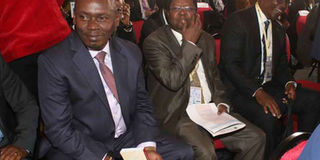By staying away from CoG conference, senators have missed a golden opportunity

From left, Kiambu Governor William Kabogo, Embu Governor Martin Wambora and Nairobi's Evans Kidero follow proceedings during the 2016 Devolution conference at Meru Polytechnic on April 20, 2016. Senators, who skipped the event, cannot represent counties and protect their interests and those of their governments by creating a chasm between them and governors. PHOTO | JOSEPH KANYI | NATION MEDIA GROUP
What you need to know:
- All the elected 47 Senators skipped the event, leaving only Speaker Ekwe Ethuro and three nominated colleagues to represent the House. That is unacceptable.
- Whatever disagreements there may arise between senators and governors, the constitutional role of the Senate is to represent counties and protect their interests and those of their governments.
- Senators cannot represent counties and protect their interests and those of their governments by creating a chasm between them and governors.
- Senators will protect the interests of counties by airing and discussing their differences with governors at open fora such as the CoG conference.
At the opening of the third devolution conference in Meru County, the home of the chairman of the Council of Governors (CoG) Mr Peter Munya, on Wednesday, it was obvious that all is not well between Kenya’s county governments, on the one hand, and the Senate, National Assembly and the National Government, on the other.
First, all the elected 47 Senators skipped the event, leaving only Speaker Ekwe Ethuro and three nominated colleagues to represent the House. That is unacceptable.
Whatever disagreements there may arise between senators and governors, the constitutional role of the Senate is to represent counties and protect their interests and those of their governments.
Senators cannot represent counties and protect their interests and those of their governments by creating a chasm between them and governors.
Senators will protect the interests of counties by airing and discussing their differences with governors at open fora such as the CoG conference.
Indeed, the caucus is in many ways a stock taking event.
When the governors painted rosy pictures of their successes, the senators, who skipped the conference in part because they accuse governors of corruption, tribalism and downright theft, were nowhere to present opposing views and suggest the possible ways of rectifying matters.
GOLDEN CHANCE MISSED
With governors now back to their enclaves; a golden chance was missed.
Second, I was not totally surprised that Members of the National Assembly similarly gave the conference a wide berth.
In February, the Kisii County Government organised a popular and successful four-day entrepreneurship summit that showcased the county as a visitor and investor destination.
Not one of the county’s nine elected MPs showed up.
This Kisii no-show by MPs was amplified in Meru. Only one MP showed up for the opening of the conference.
MPs cannot argue that taking stock of the performance of devolved units is solely a matter for senators.
The National Assembly, the constitution says, “represents the people of the constituencies and special interests in the National Assembly.”
MPs legislate for the country and the laws they make impact their constituencies and constituents that respectively make up and people the counties.
It is, therefore, evident that an MP should work for the success of devolution because if the National Government’s double digit GDP growth is to be realised, all devolved units must contribute to that end.
WORK TOGETHER
For this to happen, the leadership of the constituencies (MPs), senators and governors, must work together.
Counties have one governor, one (elected) senator, several MPs and numerous Members of County Assemblies, but the basic agenda is development.
When legislators fight governors, they derail development and their people’s right to develop.
That means the law-makers fight something else, the constitution. As I say, devolution is the star of the constitution by which Kenya seeks to redress the imbalances wreaked over many parts of the country by 50-odd years of skewed resource allocation and prioritisation of development projects by the centre.
Enter the National Government. In his State of the Nation address early this month, President Kenyatta rightly scathingly attacked county governments for being spendthrifts, corrupt and spending most of the Sh2 trillion taxpayers’ money allocated them since 2013 on building mansions and buying limousines.
But he did not scorch the National Government in the same terms. The President did not travel to Meru to open the CoG conference and instead sent the Minister for Devolution, Mr Mwangi Kiunjuri, who read his speech.
This time, the President caustically likened governors to criminals and threatened to throw them into jail.
The President is human and is entitled to a temper, but the President should also temper his public anger with words of advice and wisdom.
Had he been at Meru, he would have had time to sit with Mr Munya, who is also given to displays of anger and arrogance, and his advisers and address the monster of corruption in devolved units.
Of course, there is corruption and wastage in county governments, but a corrupt and profligate National Government and equally corrupt and wasteful law-makers must not gang up to harangue and harass governors without addressing the logs of graft in their eyes.
These leaders have only one way to bridge this divide: Relentlessly discuss sharing of Kenya’s wealth and its prudent application.





